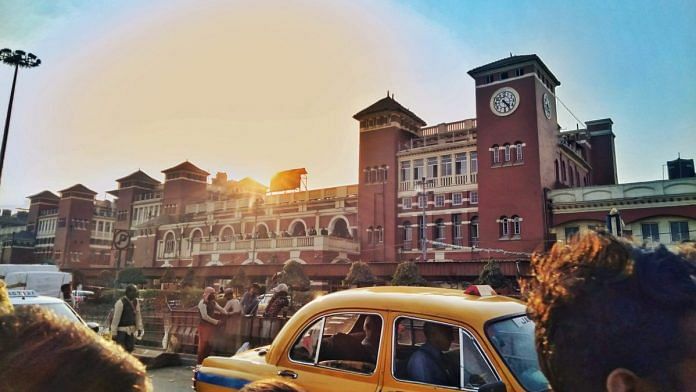Why is Kolkata disproportionately in the news when it comes to financial scams?
I don’t know whether to be proud or embarrassed by the fact that 50 companies based in my city have contributed heavily to political parties through electoral bonds. Fifty companies? The Kolkata I know is the capital of a state from where companies and industries flee. Which are these 50 companies with so much spare cash?
According to a Hindu Business Line report, of the 50 top bond buyers in the country, 16 are Kolkata-based firms, which cumulatively purchased electoral bonds of Rs 1,925.8 crore.
There are more bond buyers from Kolkata other than these 16 companies in the top 50. Data presented by the Association for Democratic Reforms (ADR) shows that until January 2024, Kolkata saw the maximum number of electoral bonds purchased —7,834 worth Rs 3,333.8 crore. Mumbai was second, with 5,426 bonds worth Rs 4,000 crore purchased.
Here’s a small list of top companies in Kolkata that purchased these bonds:
— Seven companies of the Aditya Birla Group spent Rs 545.8 crore.
— Six companies of the RP Sanjiv Goenka Group spent Rs 609 crore.
— Four companies of the MK Jalan Group spent Rs 616.9 crore.
The Aditya Birla Group’s companies are registered in Kolkata for legacy reasons: the family has roots in this city. The RP Sanjiv Goenka group is a familiar entity. One of his many companies powers Kolkata city. The MK Jalan Group has outstripped both the Goenka and Birla groups to become the third biggest buyer of bonds in the country.
In case MK Jalan Group doesn’t ring a bell, it includes Keventers, the milkshake makers you may remember if you are about 60 or a thirsty Gen Z who frequents malls. (Colas, however, sell more).
The MK Jalan Group has drawn a lot of attention because of the significant gap between the companies’ wealth and the amount it spent on electoral bonds.
So where is all the money coming from in poor, frugal Kolkata? Can it all be clean money or is there something dubious about it?
Such suspicions are not really misplaced. Kolkata has a long history of being a hotspot for hot money and financial scams of an incredible variety.
Also read: Kolkata is India’s newest, biggest scam zone. Police, YouTubers, mice can’t shut it down
Kolkata’s scam-tainted history
Remember the East India Company, which set up shop in Kolkata? During its heyday, English and native businessmen made pots of money from selling opium to China, something that hurt farmers in Bihar and Uttar Pradesh but fattened many coffers. Check out this BBC article or read William Dalrymple’s Anarchy and Amitava Ghosh’s River of Smoke.
After Independence, the first big financial scam to hit the country had a Kolkata connection. Known as the Mundhra scandal, the scam involved Kolkata-based stock speculator Haridas Mundhra, who bumped up share prices through false means and drove the LIC into losing money by making it invest in weak companies. The scandal resulted in the resignation of then-finance minister TT Krishnamachari. Mundhra died in 2018.
West Bengal was next hit by the chit fund scam in 1980 and then again in 2013. The Sanchaita ponzi scam and, more recently, Saradha and Rose Valley chit funds robbed lakhs of people of their life savings.
All this happened while the number of shell companies in Kolkata continued to multiply—these companies had no real business and were used to launder money and rationalize tax liabilities. Between 2018 and 2021, the central government struck off 2,38,223 entities across India as shell companies. Mumbai topped the list with 52,869. Kolkata took the fifth spot with 15,022 companies.
Many of the companies that have bought the electoral bonds could be just that: shell companies fronted for other entities to channel money to political parties. Some political observers claim privately that political parties with illicit sources of income may have used these shell companies to turn black money into white through electoral bonds. Rotating, round tripping, washing machine: a scam by any other name.
I don’t know what I am more embarrassed about as a native of Kolkata: that Kolkata is such a big buyer of electoral bonds? Or that Kolkata’s ruling political party is also the second biggest recipient of money from electoral bonds?
No one in the Trinamool Congress has said a word about it. Reports suggest that back in 2018, when the Supreme Court sought details, the TMC affidavit stated that some unknown people had come and left the electoral bonds in a dropbox at its office.
As for the BJP, it’s the biggest labharthi (beneficiary) of the electoral bond scam. Because a scam is what it is: anonymous donors donating thousands of crores of rupees to political parties, days after raids by central agencies.
The author is a senior journalist based in Kolkata. She tweets @Monideepa62. Views are personal.
(Edited by Prashant)



